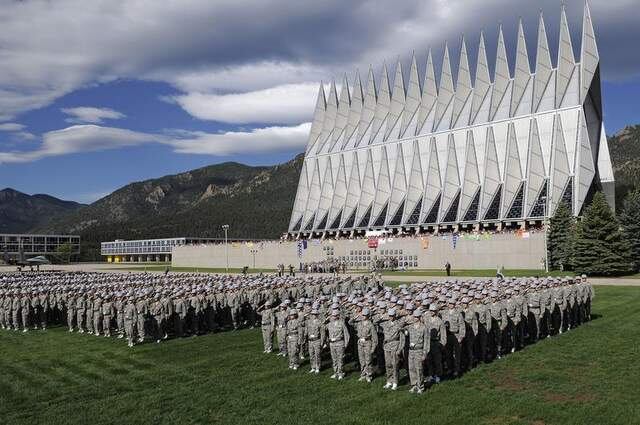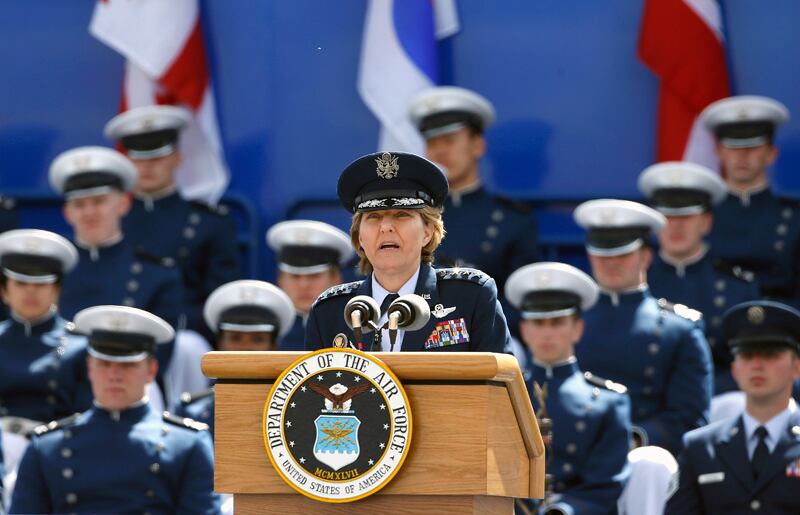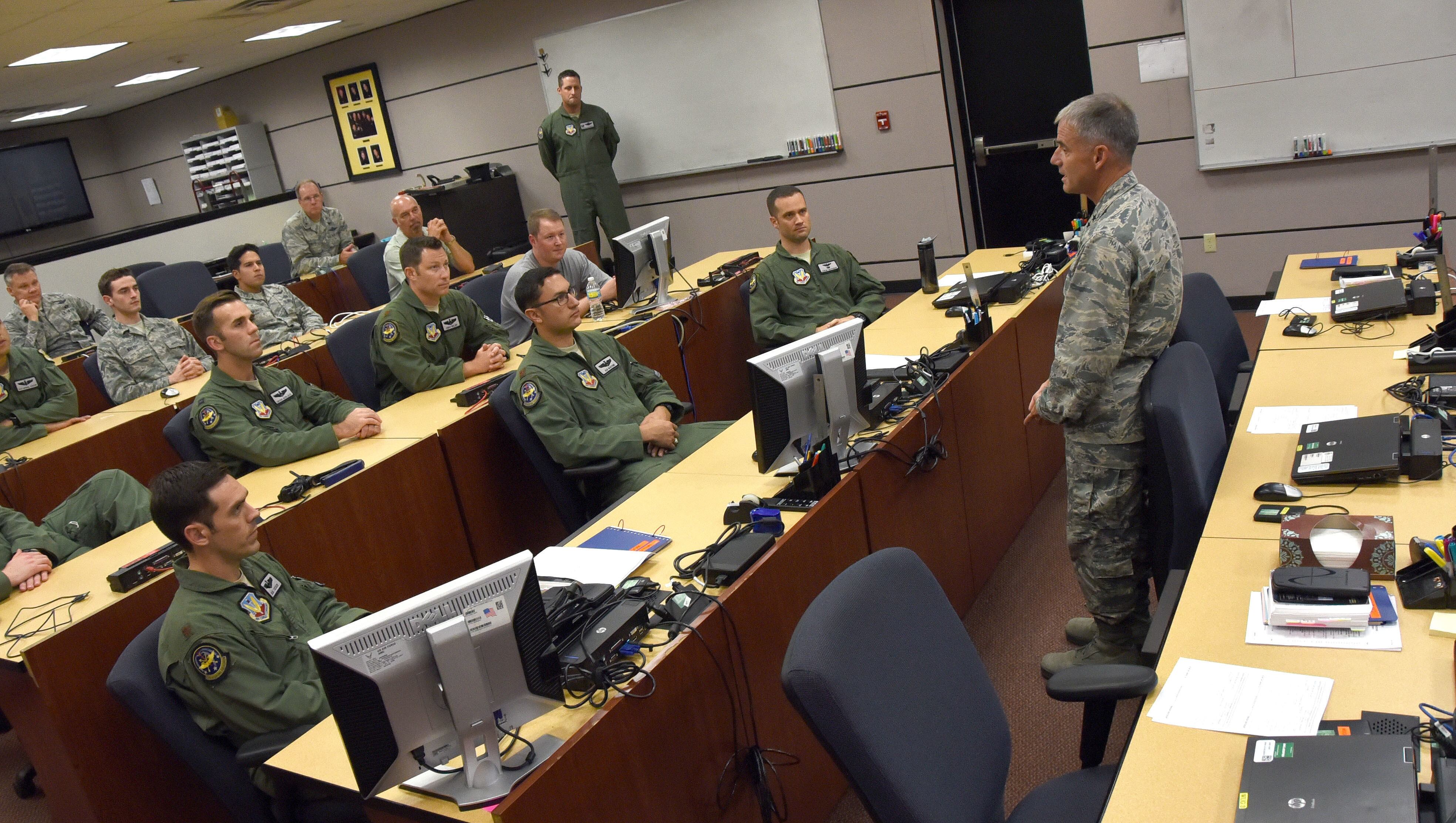COLORADO SPRINGS, Colo. — Lt. Gen. Michelle Johnson uses flight terms to describe her four years in command of the Air Force Academy.
And one word comes up again and again: “Turbulence.”
A government shutdown and budget cuts, trouble in the athletic program, and, lately, an investigation into the academy’s Sexual Assault Prevention and Response Office — two-thirds of its staff has been suspended — are among the issues that have roiled the air for the academy’s first female leader.
Turbulence has also been generated by changes Johnson brought to the school, which she says unsettled the academy’s alumni, who worry that tradition has been sacrificed on the altar of modern methods.
“We’re doing a lot that’s different and a lot of older alumni are having trouble with that,” Johnson told the academy’s Board of Visitors last month.
Johnson, who handed off command of the academy to Maj. Gen. Jay Silveria, is used to shaking up traditions.
A member of the second class of women admitted to the Air Force Academy after President Gerald Ford eliminated gender discrimination at the nation’s military schools, Johnson quickly stood out from her peers.
“As a farm girl from Iowa in 1977, I never could have imagined the amazing opportunities and even more amazing people and places I would have the privilege of experiencing over the following 40 years,” Johnson said in a statement released by her public affairs office.
Cadet Johnson was a star on the hardwood, scoring a record 1,706 points for the academy women’s basketball team. She also was the first woman to be named cadet wing commander.
Johnson went on to become a Rhodes scholar, a tanker and transport pilot, an Air Force Academy professor, a squadron and wing commander, the Air Force’s top spokeswoman, and NATO’s top operations officer.
Along the way, she also became a wife and a mother of twin boys.
In 2013, she came back to the academy.
While her move shattered a glass ceiling, that’s not a subject Johnson talked about.
Overcoming longstanding discrimination to become the first woman to lead the academy is just another confirmation of the greatness of the country she serves, Johnson said.
“It’s a very American experience,” Johnson said shortly after taking over as the school’s 19th superintendent.
On her way out, Johnson also isn’t talking about the role her gender played. She is talking about gratitude for an opportunity that no other woman has experienced.
“I’m blessed beyond measure to have had a career bookended by assignments at the Air Force Academy — this is a special place and I don’t think it’s possible to spend much time here as a cadet or as one of those entrusted with educating and training those cadets without feeling that sense of appreciation,” Johnson said in a statement.
But coming back to Colorado Springs in 2013 wasn’t without challenges.
RELATED

Two months after Johnson took command, congressional budget battles led to a government shutdown that put 5,000 local Defense Department civilian employees out of work. One of those workers was in charge of ordering toilet paper for the academy, prompting a crisis within the budget crisis.
“This is new ground for our country and for us,” Johnson said at the time.
In December 2013, the academy was rocked by revelations that the Air Force Office of Special Investigations had used cadets as informants to spy on their classmates. One of the informants, former cadet Eric Thomas, contends he was kicked out of the school for actions he took as an informant.
Johnson called for an inspector general investigation into the allegations. But the informant story would soon lead to more allegations — that academy athletes had engaged in a pattern of misconduct that included drug abuse, sexual assault and cheating in class.
As the scandal made national headlines, Johnson ordered an investigation into the misconduct. She parted ways with longtime Athletic Director Hans Mueh and brought in current Athletic Director Jim Knowlton.
The Athletic Department kicked off new training programs and began more closely screening its recruits.
Last month, Johnson said athletes at the academy have gone from sources of strife to role models.
“Now they are our shining stars,” Johnson told the school’s Board of Visitors.

In the wake of the scandals, Johnson also led an unprecedented public relations effort, spending $2.6 million on outside PR firms in a bid to polish the academy’s image.
The latest of what Johnson called “turbulence” came in June when the school suspended four of six members of its Sexual Assault Prevention and Response Office. The academy has released few details of an investigation into the office. Johnson said the academy is working with the Pentagon to rebuild the office.
Two other Johnson efforts made more fundamental, but subtle changes at the school. For the first time in generations, Johnson ordered a rewrite of the school’s curriculum to incorporate more liberal arts classes on a campus known for math and science.
She also gave cadets more control of their lives. Upperclassmen were allowed to leave campus in the evenings and were expected to balance their professional and personal lives in a way never before permitted.
Johnson said by allowing cadets to have more choices, they are better prepared for life after the academy.
The goal, she said, is to have cadets understand the full scope of their responsibilities and “have them start thinking that way before they are lieutenants.”
Other changes came in the academy’s approach to physical training. Upperclassmen who used to get a pass from some of the school’s most rigorous physical training now had to join in. Other physical challenges that were once used to wash out underperforming freshmen were turned into communal challenges with lower stakes.
Johnson said the shift reflected a change in the way America fights.
“Physical courage is important, but moral courage is so needed now,” Johnson said. “We have to think about that aspect of being a warrior that isn’t physical.”
RELATED

That focus on morality had an impact.
Disciplinary numbers at the academy fell to the lowest levels seen in a decade last year under Johnson’s leadership, with 80 of the school’s 4,000 cadets accused of violating the academy honor code.
Sexual assault numbers at the academy also tumbled in the Johnson years, with 32 in the academic year that ended last June, down from 49 a year earlier.
Johnson said the academy has gone from being a cautionary tale on matters of sexual assault to a national example in how to prevent campus rapes.
“People have started to come to us,” Johnson said of the school’s leadership on sexual assault issues. “Athletic directors from around the country come here.”
Part of that change is thought to be tied to a program Johnson spearheaded to teach all cadets about “healthy relationships.” The courses take cadets through the path of romance from dating to marriage. Along the way, they’re encouraged to talk about their experiences and to discuss issues like what “consent” means in a sexual setting.
Johnson told the Board of Visitors that she keeps a personal eye on the training.
“I like to sit in the back so they can have very frank conversations,” she said.
In her statement, Johnson said she had wanted to do more.
“Though I feel great encouragement from what we’ve accomplished as a team in these last four years, I’m not satisfied,” Johnson said.
“I don’t think any leader in our Air Force leaves a command feeling like they’ve accomplished everything they set out to do.”
The school has passed much of the turbulence on its course into the future. It’s on a course for success, she said.
“We’re on a climb.”





